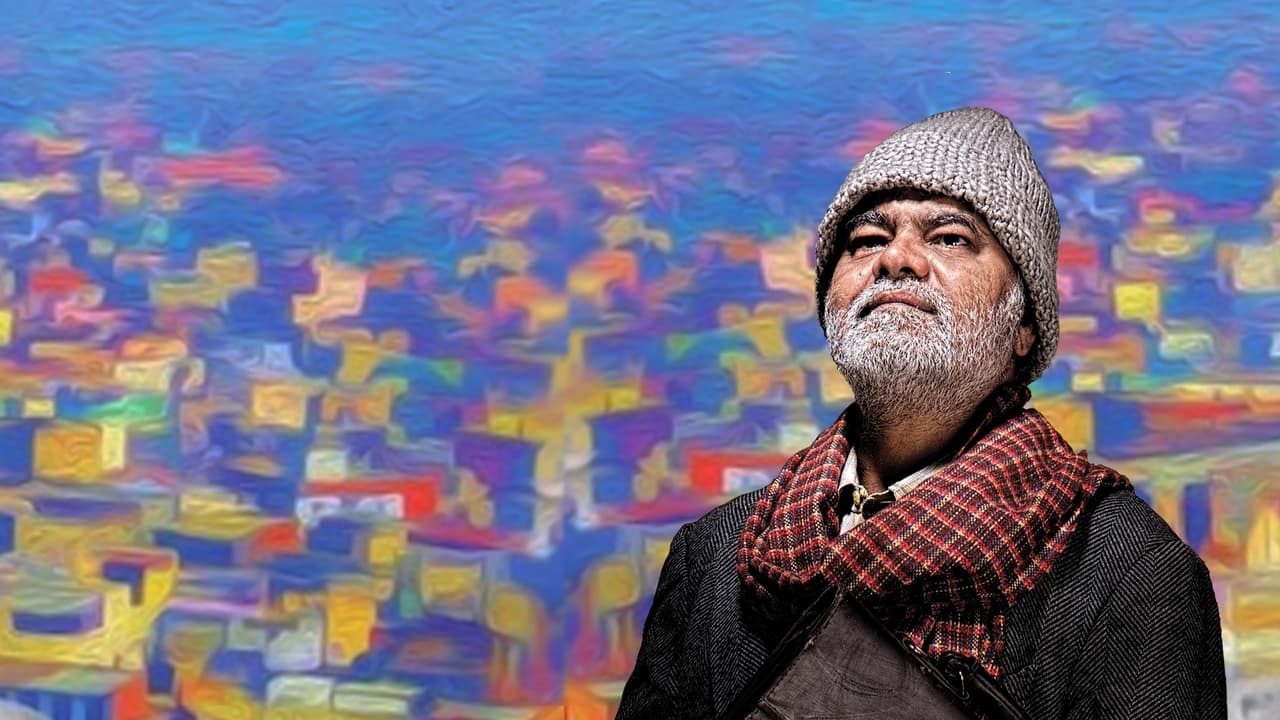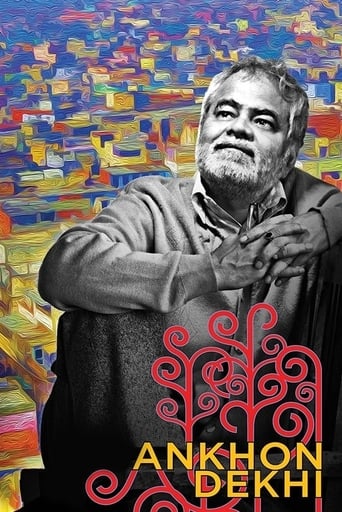

My review here is unique in the sense that I want to criticize the film and hence my review is different from all other reviews. The reviews of the film posted here on IMDb (and elsewhere) are good and some of them are brilliant but I found some pseudo-admiration of the movie which prompted me to write the review.The movie is good because of its uniqueness, not many movies are made in commercial cinema which take the theme adopted in the movie. So people who love to watch art/parallel cinema would surely be attracted to the concept of the movie. The actors in the movie are mostly theater artists, who are popular for good acting and commonly appear in low-budget films. The basic theme of the movie showing the life experiences of the protagonist from ''his own eyes'' is appealing and philosophical in its essence. The film clearly showed demonstration of philosophical principle of "seeing is believing" through discussions, mass awareness campaigns (standing at metro station with message board in hand), life experiences of the lead character, Sanjay Mishra. When the movie had so many scenes conveying the philosophical ideas, yet I do not understand why most of the reviewers are saying that movie doesn't intend to spread any message. It seems pseudo-admiration at its heights!! The beautiful part of the movie is its emphasis on family roles and responsibilities, and dynamics of attachments and emotions among family members. The movie is set in a joint family context, which is shown in the beginning following strict social norms and conventions. Looking at all the mess going on around the family, and his inability to handle the circumstances, the lead character of Bauji diverts everyone's attention to his sudden shift of philosophical ideas and preoccupation of the principle "seeing is believing". When everyone was following "believing is seeing, he chose to do the opposite. At this point it seemed that the movie would take on deep, mysterious turns and would show depth of the protagonist's character. But the movie is disappointing in this regard.The movie takes many turns and shifts in actions of Bauji - not believing in anything heard until experienced, leaving job due to his ideas, remaining silent because everyone was getting fed up of his philosophical talks which were incomprehensible by people, gambling to earn money, brother and his family separating to manage their expenses and duties etc.. All these incidents shake the feelings of Bauji to the core and it is seen that with every incident he takes some dramatic step and changes his behaviors. But in all this superficial drama, the emotional and wise character of Bauji is showing its strength and the only merit that this movie deserves. The emotional bonds of the family members are persistent and deep, even when they separate. The responsible character of Bauji to arrange marriage for his daughter, saving his son from a debt of Rs. 28/38,000 (unclear amount) is the most appreciable part of the movie. The minute details of middle class family life of Old Delhi were remarkable. Very fine details were shown in behaviors and verbal expressions of characters, which, to me, is the only plus side of the story and adds energy to the movie. This is the only part of the movie to which anyone can relate.The most saddening part of the movie was its confusing story-line, abrupt incidents and events, lack of coherence in incidents, loose adherence with any single theme, lack of connections between different scenes/acts and sentiments of the leading character. If all other characters were predictable, the main character was uncertain and unpredictable. His unpredictable characterization made him incomprehensible and confusing. Why suddenly he became fond of philosophical ideas, why he didn't consider many daily responsibilities as important (like leaving job), how come he suddenly tended to become sannyasi-like, and why he held strong emotional bonds. On the surface he seemed to be dramatizing all this philosophical non-sense just to divert everyone else's attention from social norms and restrictions, because he was always an emotional person caring for his family. Was he trying to wind up his life's duties to experience his dream of flying, was he trying to become a good father- a liberator for himself and family? This was not clearly shown. He was trying to conclude his life as an accumulation of experiences and fulfillment of wishes.If you have seen many such movies, to make it comprehensible and easy to follow, the story-line should be consistent, convey a deep message and lesson, follows a uni-dimensional approach to story and must establish links to different scenes and themes. On the contrary, Ankhon Dekhi lacks consistent story-line (except family sequences), is multi-thematic, shows uncertain actions of the leading character which make no sense in broader picture, except attributing the protagonist as crazy and free-thinker. I do not advocate such pseudo-admiration of incomplete depictions just because these depictions are meant to be shown through the lens of an art movie. Overall, the movie doesn't give a pleasurable feeling, except admiring disconnected scenes and actions of the lead actor. There are many scenes depicting behaviors of Bauji which show strong and compassionate character, an emotional and deeply attached person who cares for family. For example, debating maths teacher of his niece, asking daughter to prepare for her marriage, saving his son from debt of gambling, appreciating classical music, being an intellectual and providing wise lessons to his followers etc.Overall, the movie is nice, watchable, shows inner turmoil of an old man who is awaiting his death, good family sentiments and strong emotional bonds within a joint family But at the same time it is inconsistent in connecting scenes and shows multiple themes/messages with loose meanings. These meanings become hidden/suppressed and no single message or theme dominates the whole film. Due to overburdening with multiple messages and themes, the movie loses its charm and pleasure. This leaves many viewers confused and disappointed.
... View MoreAnkhon Dekhi is a particular type of movie which makes one think. Rajat Kapur has done a marvelous job in scripting the movie keeping in mind the very detail. He has effortlessly captured the middle class proforma of Indian society, at the same time raising the bar with the philosophical insights of a common travel agency worker (Bauji). To question the societal norms, to believe in something which one can only justify by using one's senses has been the foundation of the movie. Bauji starts questioning things which we have taken for granted. His actions draw laughter from the society and anxiety to his family. Yet his unhindered walk for the verified truth continues. Rajat Kapur has failed to ignore smallest of details. From the crisis of middle class family to the thirst of the common man to find meaning and purpose in life is so seamlessly portrayed that if hardly feels reel. Adding to that is the background score, adding right pinch of salt whenever necessary. The movie throws a lot of open questions to the audience without moving to any particular resolution. After all the ending was the "ankhon dekhi anubhab" (eye witnessed experience) of Buji, which could have been as much different for someone else. The closure thus provided once again proves to be one of the most cherished and pivotal points of the movie and in an essence of the script. Surely one of my best watches till date.
... View MoreAn Indian film (Hindi) - old Bauji, narrating by way of introduction, tells us he has a recurring dream of "flying through the clouds," and the camera hovers above the little kitchen where his extended family's meals are prepared; it drifts through a window and hovers above the narrow lane, meanders over a tangle of streets, and drifts up to the tops of the buildings in Delhi - it's a twilight hour, the sky is like a glowing bruise for color, and down below it's quiet, no one about - then we are back in the apartment, and all is commotion: Bauji's young niece Rita has been out with a boy whose reputation is not good - the whole family, three generations, make an uproar about it. When some of the menfolk rush off to give the boy a walloping Bauji goes along, and finds that the boy is nothing like he's been painted. Bauji protects him, and later reflecting on what almost happened he resolves never again to believe anything he hasn't personally experienced. So thoroughly does he hold to this resolution that he can no longer perform his job, selling travel packages over the phone: he confides to customers that he doesn't really know what time the plane will depart and land, or if there will be a hotel waiting at the other end - he hasn't seen these things for himself. The manager must let him go. Being idle himself, Bauji attracts a circle of other idle men; at first they tease and mock him, but finding him so positive in his new way of life they become his disciples. What follows you must see for yourself. I could tell you that "Ankhon Dekhi" is that rarity, a philosophical comedy that's really funny - but that would just be me telling you; you won't really know, will you, until you see it.
... View MoreCharming, down to earth and true to real life.Honestly how many times we talk to ourselves. Watch this to learn the same. This movie teaches introspection. It has different angle about looking at everything. Awesome performances by all special Bauji. I can say it has class as Malgudi Days had. Loved Watching...Rajat awesomely done.All characters are real and depict typical life in northern India. Common man, his own issues, his family. In the midst of all he is trying to find himself. Though we see people following him. I wont find it wrong maybe this is something like finding yourself by practicing spirituality in everyday tasks. Yes the end is little different but worth for the movie plot. I am lifetime fan of this film maker now. All stars, no doubt this movie has won millions of hearts.
... View More